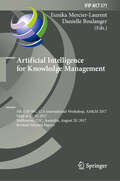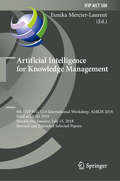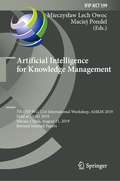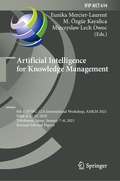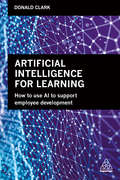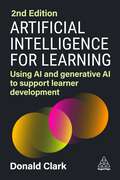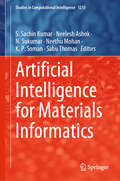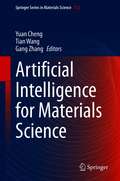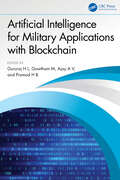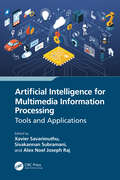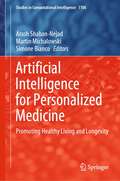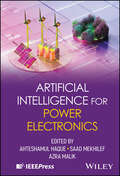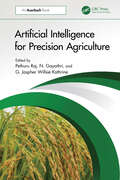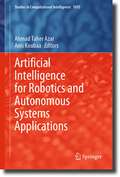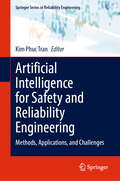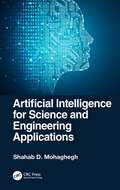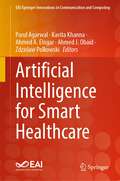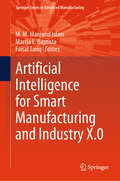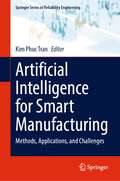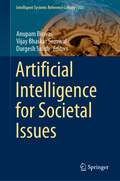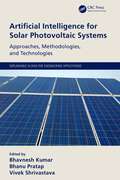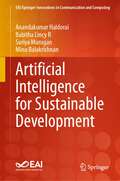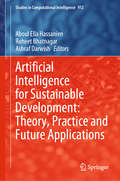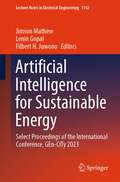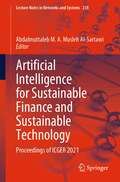- Table View
- List View
Artificial Intelligence for Knowledge Management: 5th IFIP WG 12.6 International Workshop, AI4KM 2017, Held at IJCAI 2017, Melbourne, VIC, Australia, August 20, 2017, Revised Selected Papers (IFIP Advances in Information and Communication Technology #571)
by Eunika Mercier-Laurent Danielle BoulangerThis book features a selection of extended papers presented at the 5th IFIP WG 12.6 International Workshop on Artificial Intelligence for Knowledge Management, AI4KM 2017, held in Melbourne, VIC, Australia, in August 2017, in the framework of the International Joint Conference on Artificial Intelligence, IJCAI 2017. The 11 revised and extended papers were carefully reviewed and selected for inclusion in this volume. They present new research and innovative aspects in the field of knowledge management such as machine learning, knowledge models, KM and Web, knowledge capturing and learning, and KM and AI intersections.
Artificial Intelligence for Knowledge Management: 6th IFIP WG 12.6 International Workshop, AI4KM 2018, Held at IJCAI 2018, Stockholm, Sweden, July 15, 2018, Revised and Extended Selected Papers (IFIP Advances in Information and Communication Technology #588)
by Eunika Mercier-LaurentThis book features a selection of extended papers presented at the 6th IFIP WG 12.6 International Workshop on Artificial Intelligence for Knowledge Management, AI4KM 2018, held in Stockholm, Sweden, in July 2018, in the framework of the International Joint Conference on Artificial Intelligence, IJCAI 2018.The 11 revised and extended papers were carefully reviewed and selected for inclusion in this volume. They present new research and innovative aspects in the field of knowledge management such as machine learning, knowledge models, KM and Web, knowledge capturing and learning, and KM and AI intersections.
Artificial Intelligence for Knowledge Management: 7th IFIP WG 12.6 International Workshop, AI4KM 2019, Held at IJCAI 2019, Macao, China, August 11, 2019, Revised Selected Papers (IFIP Advances in Information and Communication Technology #599)
by Mieczysław Lech Owoc Maciej PondelThis book features a selection of extended papers presented at the 7th IFIP WG 12.6 International Workshop on Artificial Intelligence for Knowledge Management, AI4KM 2019, held in Macao, China, in August 2019, in the framework of the International Joint Conference on Artificial Intelligence, IJCAI 2019.The 8 revised and extended papers were carefully reviewed and selected for inclusion in this volume. They present new research and innovative aspects in the field of knowledge management such as machine learning, knowledge models, KM and Web, knowledge capturing and learning, and KM and AI intersections.
Artificial Intelligence for Knowledge Management: 8th IFIP WG 12.6 International Workshop, AI4KM 2021, Held at IJCAI 2020, Yokohama, Japan, January 7–8, 2021, Revised Selected Papers (IFIP Advances in Information and Communication Technology #614)
by Eunika Mercier-Laurent M. Özgür Kayalica Mieczyslaw Lech OwocThis book features a selection of extended papers presented at the 8th IFIP WG 12.6 International Workshop on Artificial Intelligence for Knowledge Management, AI4KM 2021, held in Yokohama, Japan, in January 2021, in the framework of the International Joint Conference on Artificial Intelligence, IJCAI 2020.*The 14 revised and extended papers presented together with an invited talk were carefully reviewed and selected for inclusion in this volume. They present new research and innovative aspects in the field of knowledge management and discuss methodological, technical and organizational aspects of artificial intelligence used for knowledge management.*The workshop was held virtually.
Artificial Intelligence for Learning: How to use AI to Support Employee Development
by Donald ClarkArtificial intelligence is creating huge opportunities for workplace learning and employee development. However, it can be difficult for L&D professionals to assess what difference AI can make in their organization and where it is best implemented. Artificial Intelligence for Learning is the practical guide L&D practitioners need to understand what AI is and how to use it to improve all aspects of learning in the workplace. It includes specific guidance on how AI can provide content curation and personalization to improve learner engagement, how it can be implemented to improve the efficiency of evaluation, assessment and reporting and how chatbots can provide learner support to a global workforce.Artificial Intelligence for Learning debunks the myths and cuts through the hype around AI allowing L&D practitioners to feel confident in their ability to critically assess where artificial intelligence can make a measurable difference and where it is worth investing in. There is also critical discussion of how AI is an aid to learning and development, not a replacement as well as how it can be used to boost the effectiveness of workplace learning, reduce drop off rates in online learning and improve ROI. With real-world examples from companies who have effectively implemented AI and seen the benefits as well as case studies from organizations including Netflix, British Airways and the NHS, this book is essential reading for all L&D practitioners needing to understand AI and what it means in practice.
Artificial Intelligence for Learning: Using AI and Generative AI to Support Learner Development
by Donald ClarkWith Artificial Intelligence (AI) creating huge opportunities for learning and employee development, how can learning professionals best implement the use of AI into their environment?Artificial Intelligence for Learning is the essential guide for learning professionals who want to understand how to use AI to improve all aspects of learning in organizations. This new edition debunks the myths and misconceptions around AI, discusses the learning theory behind generative AI and gives strategic and practical advice on how AI can be used.This book also includes specific guidance on how AI can provide learning support, chatbot functionality and content, as well as ideas on ethics and personalization. This book is necessary reading for all learning practitioners needing to understand AI and what it means in practice.
Artificial Intelligence for Materials Informatics (Studies in Computational Intelligence #1213)
by Sabu Thomas N. Sukumar S. Sachin Kumar Neelesh Ashok Neethu Mohan K. P. SomanThis comprehensive book explores the transformative impact of AI on materials informatics, delving into machine learning/deep learning, and material knowledge representation. Embracing the transformative power of artificial intelligence (AI), the field of materials informatics has witnessed a remarkable revolution in its methodology and applications. AI has revolutionized the field of materials informatics, enabling researchers to discover, design, and optimize materials with enhanced properties at an accelerated pace. It showcases how AI is accelerating materials discovery, property prediction, providing case studies, and a comprehensive bibliography for further exploration. This essential resource equips researchers, scientists, and engineers with the knowledge and tools to harness the power of AI for groundbreaking advancements in materials science.
Artificial Intelligence for Materials Science (Springer Series in Materials Science #312)
by Yuan Cheng Gang Zhang Tian WangMachine learning methods have lowered the cost of exploring new structures of unknown compounds, and can be used to predict reasonable expectations and subsequently validated by experimental results. As new insights and several elaborative tools have been developed for materials science and engineering in recent years, it is an appropriate time to present a book covering recent progress in this field.Searchable and interactive databases can promote research on emerging materials. Recently, databases containing a large number of high-quality materials properties for new advanced materials discovery have been developed. These approaches are set to make a significant impact on human life and, with numerous commercial developments emerging, will become a major academic topic in the coming years. This authoritative and comprehensive book will be of interest to both existing researchers in this field as well as others in the materials science community who wish to take advantage of these powerful techniques. The book offers a global spread of authors, from USA, Canada, UK, Japan, France, Russia, China and Singapore, who are all world recognized experts in their separate areas. With content relevant to both academic and commercial points of view, and offering an accessible overview of recent progress and potential future directions, the book will interest graduate students, postgraduate researchers, and consultants and industrial engineers.
Artificial Intelligence for Military Applications with Blockchain
by Gowtham M Gururaj H L Ajay A V Pramod H BIn an era where advanced technology plays a critical role in maintaining national security, Artificial Intelligence for Military Applications with Blockchain investigates how combining AI and blockchain could transform military operations. This comprehensive guide offers creative answers for contemporary military problems while addressing the most important defense-related concerns, from data security to decision-making.It explores constrained networking middleware for defense applications, guaranteeing smooth communication under critical circumstances. This book starts with an in-depth examination of blockchain’s potential to improve document management across defense departments, then moves to a detailed discussion of security and privacy in military applications. The integration of AI and blockchain in military context is then the main topic of discussion, along with its advantages, disadvantages, and real-time applications.The potential of blockchain and AI to protect data and streamline operations is also explored, providing readers with insights into the military and healthcare sectors. This book offers a thorough examination of the military’s current and future use of AI, as well as a breakdown of cybersecurity issues and how blockchain technology is being used to improve military cybersecurity. A dedicated chapter examines the ways in which blockchain technology is being used by computational intelligence to transform the defense environment.Key features: Examines privacy and security issues in military blockchain applications Investigates military operations using constrained networking middleware Discusses integrating AI and blockchain technology for military applications Includes case studies of blockchain and AI uses in the military and healthcare Thoroughly examines cybersecurity issues and how blockchain technology can help This book is essential for military personnel, defense academics, and cybersecurity specialists interested in the use of AI and blockchain for defense. It presents real-world examples and case studies together with an outlook on how these technologies will influence future military operations.
Artificial Intelligence for Multimedia Information Processing: Tools and Applications
by Xavier Savarimuthu Sivakannan Subramani Alex Noel Joseph RajAdvances in artificial intelligence (AI), widespread mobile devices, internet technologies, multimedia data sources, and information processing have led to the emergence of multimedia processing. Multimedia processing is the application of signal processing tools to multimedia data—text, audio, images, and video—to allow the interpretation of these data, particularly in urban and smart city environments. This book discusses the new standards of multimedia and information processing from several technological perspectives, including analytics empowered by AI, streaming on the intelligent edge, multimedia edge caching and AI, services for edge AI, and hardware and devices for multimedia on edge intelligence.FEATURES Covers a wide spectrum of enabling technologies for AI and machine learning for multimedia and information processing Includes many applications using AI, from robotics and driverless cars to environmental, human health, and remote sensing Presents an overview of the fundamentals of AI and multimedia processing: imaging, signal, and speech Explains new models and architectures for multimedia streaming, services, and caching for AI Discusses the emerging paradigms of the deployment of hardware and devices for multimedia on edge intelligence Gives recommendations for future research in multimedia and AI This book is written for engineers and graduate students in image and signal processing, information processing, environmental engineering, medical and public health, etc., who are interested in machine learning, deep learning, and multimedia processing.
Artificial Intelligence for Personalized Medicine: Promoting Healthy Living and Longevity (Studies in Computational Intelligence #1106)
by Simone Bianco Arash Shaban-Nejad Martin MichalowskiThis book aims to highlight the latest achievements in the use of AI in personalized medicine and healthcare delivery. The edited book contains selected papers presented at the 2023 Health Intelligence workshop, co-located with the Thirty-Seven Association for the Advancement of Artificial Intelligence (AAAI) conference, and presents an overview of the issues, challenges, and potentials in the field, along with new research results. This book provides information for researchers, students, industry professionals, clinicians, and public health agencies interested in the applications of AI in medicine and public health.
Artificial Intelligence for Power Electronics
by Saad Mekhilef Ahteshamul Haque Azra MalikThorough review of how artificial intelligence can enhance the design, control, and optimization of power electronics systems Artificial Intelligence for Power Electronics provides a comprehensive overview of the intersection between artificial intelligence (AI) and the field of power electronics, exploring how AI can revolutionize and enhance the design, control, and optimization of power electronics systems. The book covers the fundamentals of AI, the fundamentals of power electronics and the challenges the field faces in design to production, and the solutions of these challenges through AI methods. Example solutions, along with Q&A review sections, are included throughout the text, with coverage of both Python and MATLAB. Topics discussed in Artificial Intelligence for Power Electronics include: Supervised, unsupervised, and reinforcement machine learning and the role of data in training machine learning modelsTechniques for AI data collection in power electronics and how to clean, normalize, and handle missing values of dataOptimization techniques such as Particle Swarm Optimization and Ant Colony OptimizationDetection techniques for identifying faults and anomalies and clustering algorithms to group similar operational behaviorEssential Python libraries for machine learning and how to perform machine learning on a Raspberry Pi Delivering an industry-specific approach to AI applications, Artificial Intelligence for Power Electronics is a helpful reference for undergraduate, postgraduate, and PhD students in electrical, electronic, and computer engineering. Mechanical engineers and other industry professionals may also find it valuable.
Artificial Intelligence for Precision Agriculture
by Pethuru Raj N. Gayathri Kathrine, G. Jaspher WillsiePrecision agriculture is a next-generation farming management concept that optimizes resource use, productivity, quality, profitability, and sustainability by observing and responding to crop variability. Precision agriculture employs digital technologies such as the Internet of Things (IoT), artificial intelligence (AI), 5G communication, cybersecurity, edge computing, cloud-native principles, and blockchain to ensure crops and soil receive exactly what they need for optimal health and productivity.Artificial Intelligence for Precision Agriculture explores the latest developments in precision agriculture, detailing how AI contributes to its goals. The book discusses how precision agriculture solutions use IoT devices, data storage, AI analytics, connectivity, and cloud infrastructures to analyze factors such as soil type, terrain, weather, plant growth, and yield data. It also examines edge technologies—sensors, microchips, beacons, RFID tags, robots, drones, and actuators—that collect field data and transmit it to cloud-based AI platforms for analysis. The book shows how AI-driven insights guide actions in the field, such as crop rotation, optimal planting and harvesting times, and soil management, and help farmers apply the right amounts of water, fertilizers, and pesticides, reducing waste and environmental impact. Applications covered in the book include: Drone-based high-resolution field mapping Tracking crops Crop yield assessments Data collection for irrigation, fertilization, and crop management Advanced weather monitoring Equipment management With chapters on AI model development, plant disease detection and remediation, sustainable farming techniques, data integration, AI-enabled data analytics, and knowledge visualization, this book is a comprehensive guide to technologies and applications in precision agriculture.
Artificial Intelligence for Robotics and Autonomous Systems Applications (Studies in Computational Intelligence #1093)
by Anis Koubaa Ahmad Taher AzarThis book addresses many applications of artificial intelligence in robotics, namely AI using visual and motional input. Robotic technology has made significant contributions to daily living, industrial uses, and medicinal applications. Machine learning, in particular, is critical for intelligent robots or unmanned/autonomous systems such as UAVs, UGVs, UUVs, cooperative robots, and so on. Humans are distinguished from animals by capacities such as receiving visual information, adjusting to uncertain circumstances, and making decisions to take action in a complex system. Significant progress has been made in robotics toward human-like intelligence; yet, there are still numerous unresolved issues. Deep learning, reinforcement learning, real-time learning, swarm intelligence, and other developing approaches such as tiny-ML have been developed in recent decades and used in robotics.Artificial intelligence is being integrated into robots in order to develop advanced robotics capable of performing multiple tasks and learning new things with a better perception of the environment, allowing robots to perform critical tasks with human-like vision to detect or recognize various objects. Intelligent robots have been successfully constructed using machine learning and deep learning AI technology. Robotics performance is improving as higher quality, and more precise machine learning processes are used to train computer vision models to recognize different things and carry out operations correctly with the desired outcome.We believe that the increasing demands and challenges offered by real-world robotic applications encourage academic research in both artificial intelligence and robotics. The goal of this book is to bring together scientists, specialists, and engineers from around the world to present and share their most recent research findings and new ideas on artificial intelligence in robotics.
Artificial Intelligence for Safety and Reliability Engineering: Methods, Applications, and Challenges (Springer Series in Reliability Engineering)
by Kim Phuc TranThis book is a comprehensive exploration of the latest theoretical research, technological advancements, and real-world applications of artificial intelligence (AI) for safety and reliability engineering. Smart manufacturing relies on predictive maintenance (PdM) to ensure sustainable production systems, and the integration of AI has become increasingly prevalent in this field. This book serves as a valuable resource for researchers, practitioners, and decision-makers in manufacturing. By combining theoretical research, practical applications, and case studies, it equips readers with the necessary knowledge and tools to implement AI for safety and reliability engineering effectively in smart manufacturing contexts.
Artificial Intelligence for Science and Engineering Applications
by Shahab D. MohagheghArtificial Intelligence (AI) is defined as the simulation of human intelligence through the mimicking of the human brain for analysis, modeling, and decision‑making. Science and engineering problem solving requires modeling of physical phenomena, and humans approach the solution of scientific and engineering problems differently from other problems. Artificial Intelligence for Science and Engineering Applications addresses the unique differences in how AI should be developed and used in science and engineering. Through the inclusion of definitions and detailed examples, this book describes the actual and realistic requirements as well as what characteristics must be avoided for correct and successful science and engineering applications of AI.This book:• Offers a brief history of AI and covers science and engineering applications• Explores the modeling of physical phenomena using AI• Discusses explainable AI (XAI) applications• Covers the ethics of AI in science and engineering• Features real‑world case studiesOffering a probing view into the unique nature of scientific and engineering exploration, this book will be of interest to generalists and experts looking to expand their understanding of how AI can better tackle and advance technology and developments in scientific and engineering disciplines.
Artificial Intelligence for Smart Healthcare (EAI/Springer Innovations in Communication and Computing)
by Zdzislaw Polkowski Ahmed A. Elngar Ahmed J. Obaid Parul Agarwal Kavita KhannaThis book provides information on interdependencies of medicine and telecommunications engineering and how the two must rely on each other to effectively function in this era. The book discusses new techniques for medical service improvisation such as clear-cut views on medical technologies. The authors provide chapters on communication essentiality in healthcare, processing of medical amenities using medical images, the importance of data and information technology in medicine, and machine learning and artificial intelligence in healthcare. Authors include researchers, academics, and professionals in the field.
Artificial Intelligence for Smart Manufacturing and Industry X.0 (Springer Series in Advanced Manufacturing)
by Faisal Tariq M. M. Manjurul Islam Marcia L. BaptistaThis book offers a foundational understanding of smart manufacturing (SM) and introduces effective AI methods tailored for smart manufacturing, including supervised, unsupervised, and reinforcement learning techniques. It also features real-world industrial case studies that demonstrate the practical applications of smart manufacturing. Drawing from the invaluable experiences gleaned from the aviation, healthcare, and semiconductors industries, this book provides an in-depth understanding of how AI is driving transformative changes in the manufacturing landscape. In the era of rapid technological advancements, the integration of AI into manufacturing processes has emerged as a game-changer. This book serves as an indispensable guide for navigating this transformation, presenting readers with a multidimensional perspective on the diverse applications, challenges, and opportunities that AI brings to the manufacturing sector. The book explores the emergence of Large Language Models (LLMs) as a valuable tool in manufacturing. It presents how LLMs, especially the GPT series, can process and generate textual data, offering potential applications in areas like smart manufacturing and big-data analysis. It contains detailed case studies, illustrating the practical implementation of smart manufacturing in different industries. The aviation, healthcare, automotive, and semiconductors sectors are examined, highlighting tangible benefits, challenges faced, and lessons learned from each domain. The book addresses the future prospects of Industry 4.0 and beyond—the interconnected, data-driven evolution of manufacturing. It examines the potential impact of emerging technologies such as the Industrial Internet of Things (IIoT), 5G, and advanced robotics on the manufacturing landscape. Challenges and future possibilities pertaining to research and advancement in smart manufacturing within the domains of Aviation, Semiconductors, and Healthcare sectors are also discussed. The chapters will be written in a tutorial style to allow early-career researchers and industry practitioners an in-depth understanding of the various topics. The book serves as a reference for researchers, engineers, and students seeking to understand the synergy between AI, Industry 4.0, LLMs, and real-world applications.
Artificial Intelligence for Smart Manufacturing: Methods, Applications, and Challenges (Springer Series in Reliability Engineering)
by Kim Phuc TranThis book provides readers with a comprehensive overview of the latest developments in the field of smart manufacturing, exploring theoretical research, technological advancements, and practical applications of AI approaches. With Industry 4.0 paving the way for intelligent systems and innovative technologies to enhance productivity and quality, the transition to Industry 5.0 has introduced a new concept known as augmented intelligence (AuI), combining artificial intelligence (AI) with human intelligence (HI).As the demand for smart manufacturing continues to grow, this book serves as a valuable resource for professionals and practitioners looking to stay up-to-date with the latest advancements in Industry 5.0. Covering a range of important topics such as product design, predictive maintenance, quality control, digital twin, wearable technology, quantum, and machine learning, the book also features insightful case studies that demonstrate the practical application of these tools in real-world scenarios.Overall, this book provides a comprehensive and up-to-date account of the latest advancements in smart manufacturing, offering readers a valuable resource for navigating the challenges and opportunities presented by Industry 5.0.
Artificial Intelligence for Societal Issues (Intelligent Systems Reference Library #231)
by Vijay Bhaskar Semwal Anupam Biswas Durgesh SinghArtificial intelligence (AI) has the potential to provide innovative solutions to various societal issues and real-world social challenges. AI is useful in combating some of the seemingly unsolvable social crises facing the world today. Be it disaster awareness and management or demand forecasting, or healthcare informatics or disease outbreaks like COVID-19, the AI plays a pivotal role everywhere. AI has the potential to address some of the societal issues that indirectly pose challenges like cybercrime, agriculture, education, economy, and health. The book covers several applications of AI as solutions to different societal issues, which include economic empowerment, smart education system, COVID-19 detection & management, emotion detection, fraudulent transactions, applications in agriculture and health informatics, etc. The book will be helpful for the academicians and researchers working with various areas of societal issues, data science, artificial intelligence, and machine learning.
Artificial Intelligence for Solar Photovoltaic Systems: Approaches, Methodologies, and Technologies (Explainable AI (XAI) for Engineering Applications)
by Bhavnesh KumarThis book provides a clear explanation of how to apply artificial intelligence (AI) to solve the challenges in solar photovoltaic technology. It introduces readers to new AI-based approaches and technologies that help manage and operate solar photovoltaic systems effectively. It also motivates readers to find new AI-based solutions for these challenges by providing a comprehensive collection of findings on AI techniques.It covers important topics including solar irradiance variability, solar power forecasting, solar irradiance forecasting, maximum power point tracking, hybrid algorithms, swarm optimization, evolutionary optimization, sensor-based sun- tracking systems, single-axis and dual-axis sun-tracking systems, smart metering, frequency regulation using AI, emerging multilevel inverter topologies, and voltage and reactive power control using AI.This book is useful for senior undergraduate students, graduate students, and academic researchers in areas such as electrical engineering, electronics and communication engineering, computer science, and renewable energy.
Artificial Intelligence for Sustainable Development (EAI/Springer Innovations in Communication and Computing)
by Anandakumar Haldorai Suriya Murugan Babitha Lincy R Minu BalakrishnanThis book delves into the synergy between AI and sustainability. This comprehensive guide illuminates the latest trends and cutting-edge techniques, offering invaluable insights for researchers, practitioners, and policymakers interested in the cross-section of AI and sustainability. The authors illustrate how AI-driven innovations are revolutionizing environmental conservation, urban planning, healthcare, and more. The book also considers the ethical considerations and governance frameworks crucial to harnessing AI's potential for global benefit. Whether a seasoned expert or a curious newcomer, this book empowers readers to navigate the dynamic landscape of AI and sustainability, paving the way for a more eco-conscious and equitable world.
Artificial Intelligence for Sustainable Development: Theory, Practice and Future Applications (Studies in Computational Intelligence #912)
by Ashraf Darwish Aboul Ella Hassanien Roheet BhatnagarThis book highlights the latest advances in the field of artificial intelligence and related technologies, with a special focus on sustainable development and environmentally friendly artificial intelligence applications. Discussing theory, applications and research, it covers all aspects of artificial intelligence in the context of sustainable development.
Artificial Intelligence for Sustainable Energy: Select Proceedings of the International Conference, GEn-CITy 2023 (Lecture Notes in Electrical Engineering #1142)
by Jimson Mathew Lenin Gopal Filbert H. JuwonoThis book presents select proceedings of the International Conference on Green Energy, Computing, and Intelligent Technology (GEn-CITy 2023) held at the University of Southampton Malaysia in July 2023. This book primarily covers clean energy and intelligent technologies for a sustainable future. This book serves as a forum for engineers, researchers, and specialists from academia, research centers, and industry worldwide to discuss and present the latest developments and applications related to the challenges of securing green and clean energy sources for the 21st century to protect the environment.
Artificial Intelligence for Sustainable Finance and Sustainable Technology: Proceedings of ICGER 2021 (Lecture Notes in Networks and Systems #423)
by Abdalmuttaleb M. A. Musleh Al-SartawiThis book shows latest research on artificial intelligence for sustainable technology. ICGER 2021 was organized by the Accounting, Finance and Banking Department at Ahlia University, Bahrain, and was conducted on the 15th and 16th of September. The strategic partners included the University of Jordan, the Bahrain Economists Society, the Association of Chartered Certified Accountants: ACCA, Al-Barka Banking Group and the International Computer Auditing Education Association: ICAEA . The theme of the ICGER 2021 centered around artificial intelligence for sustainable finance and sustainable technology. Accordingly, the papers presented at the conference provided a holistic view of sustainable finance, sustainability, AI, financial technology, cybersecurity, blockchain, CSR, and governance. This book, unlike ever before, brings together intelligence applications of new technologies and the sustainability requirements in the era of the digital economy, with special attention given to the opportunities, challenges, for education, business growth, and economic progression of nations which will help societies (economists, financial managers, engineers, ICT specialists, digital managers, data managers, policymakers, regulators, researchers, academics, and students) to better understand, use, and control AI applications and financial technologies to develop future strategies and to achieve sustainable development goals.
